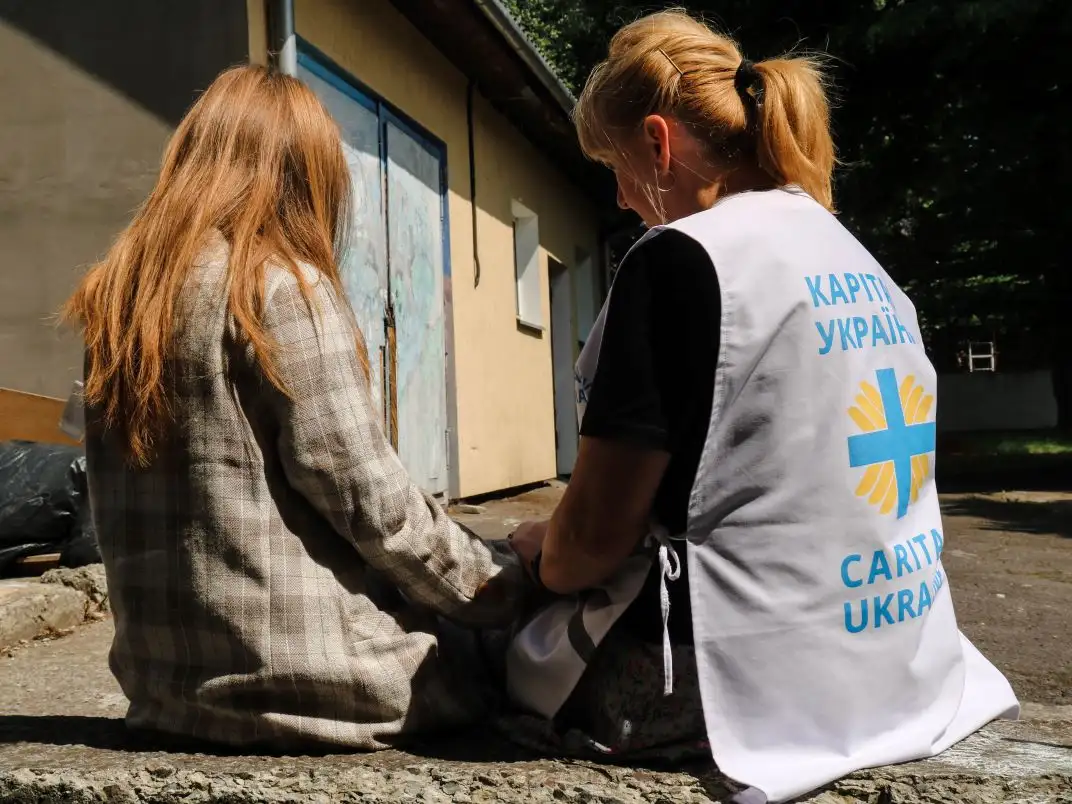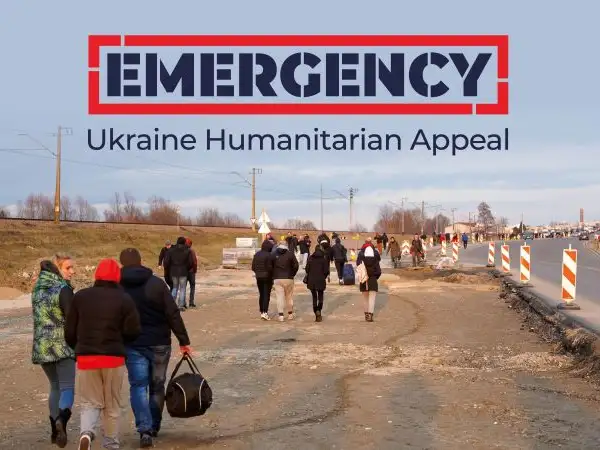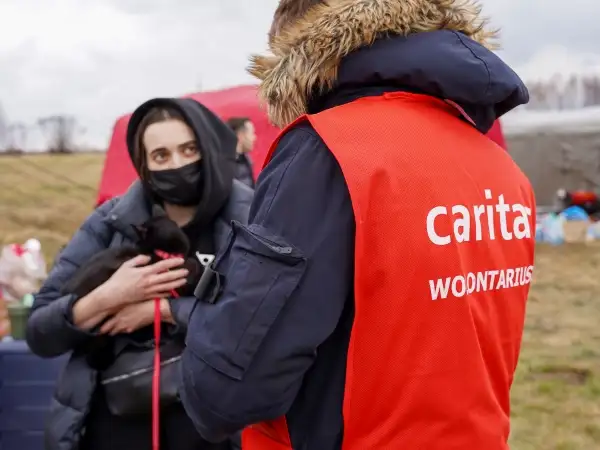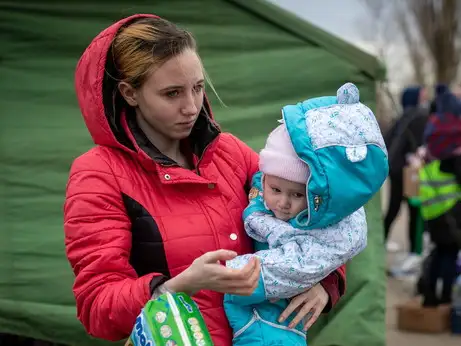Help families who've been forced to flee conflict - leaving behind jobs, belongings and loved ones.


Caritas Ukraine trained specialist working with a young survivor of human exploitation
Warning
The following article contains some very distressing information. But we think it’s very important to talk about this work. According to UN Women, 91 per cent of trafficking victims for sexual exploitation are females. Analysis of court cases shows that female victims are subjected to physical or extreme violence at the hands of traffickers at a rate three times higher than males. This is a growing problem.
From 25 November to 10 December we mark 16 Days of Activism against Gender-Based Violence, recognising the crucial work of CAFOD’s partners around the world to combat this often-hidden epidemic.
“I was very scared and afraid that I would be punished. I asked them to give me some money, but they did not. They said I couldn’t choose food or clothes or communicate with people. They said they would buy everything for me themselves. I was forbidden to communicate with my neighbours. When I started talking to my neighbours, I immediately moved.”
This is how Yulia (whose name has been changed in this article to protect her identity) describes the control mechanisms through which a couple, her senior classmates in a vocational school, trapped her in captivity during a visit to Kyiv from her hometown in eastern Ukraine. The woman posted advertisements on the internet for sexual services, while the man rented a succession of apartments and managed the financial accounts.
For two years, Yulia was forced to provide sexual services to men recruited by her captors, who physically tortured her for disobedience or failure to fulfil the wishes of 'clients'.
Yulia’s journey to recover and rebuild her life has been supported by Caritas Ukraine’s anti-trafficking team, who provided her with temporary housing and food, as well as a medical examination and psychological counselling after she was rescued from captivity by police.
I received consultations from a psychologist and a psychotherapist who brought me back to life and [helped me] come to my senses, they helped me a lot. My plans for life … I have a lot of hobbies and would like to try something new. I would like to work with children because I love them so much.
Impact of the war in Ukraine
As is so often the case during conflict, gender-based violence has increased dramatically in Ukraine since the full-scale invasion in February 2022. This includes both violence committed by military actors and domestic violence.
One form of gender-based violence that is particularly hard to identify and combat is human trafficking for the purposes of sexual exploitation. Before the full-scale invasion of Ukraine in February 2022, human trafficking was already a major problem in the country. But the conflict has created new risks for everyday Ukrainians.
Millions of citizens have been displaced to new areas both within and outside of the country where they lack community and support networks. Many displaced and non-displaced Ukrainians are in desperate financial circumstances, increasing the risk they will accept risky job offers leading to exploitation. Families have been broken up as men are forbidden to go abroad and many conscripted into the army.
As a result, more women have to act as both primary breadwinners and caregivers to children and older family members.
Traffickers have adapted their strategies to this situation. There have been reports of women and girls being kidnapped from conflict-affected areas for sex trafficking in Ukraine and Russia since Russia’s first invasion of Crimea in 2014.
Since February 2022, traffickers have started to target Ukrainian refugees (all women and children since men cannot leave the country) at international borders and in foreign countries, offering women and girls transportation and accommodation in order to recruit them into sex trafficking.
Caritas Ukraine have also supported women who were sexually exploited by groups of Russian soldiers during the full-scale Russian invasion in early 2022.
The ongoing war has accelerated these [exploitation] trends. Traffickers know how to prey on people under stress. They know exactly who to target, how to recruit vulnerable individuals for later exploitation.
In-depth support for the individual
Caritas Ukraine are one of the largest Ukrainian organisations providing emergency aid to Ukrainians affected by the war. In addition to this large-scale humanitarian response, Caritas’ anti-trafficking team raises awareness about the dangers of human trafficking among people who are particularly at-risk. This includes internally displaced persons living in temporary accommodation or students about to graduate high school. When they identify survivors of trafficking, they carefully assess the needs of each survivor and then provide in-depth, long-term support to help them rebuild their lives.
Natalia Holynska, Anti-Trafficking Project Manager at CAFOD partner Caritas Ukraine, tells us how they are supporting women who have survived sex trafficking during the war to rebuild their lives:
“It is generally believed that support [for people affected by the war] should focus on addressing basic needs: shelter, food, sanitation, hygiene and heating. At Caritas we do provide this assistance.
“However, if [we] delve deeper into the lives of some of these individuals, into their stories and the challenges they have faced, we find that many have been exploited and suffered from traumatic experiences.
“As a result, they may require psychological support, treatment, a path to recovery, and the opportunity to start a business of their own. … It brings immense joy to our hearts when we hear people say: ‘I’ve started a new life.’”
It is through this patient, tailored approach that people are able to process the trauma of their experiences and restart their lives.
Today, Yulia feels safe and well. She lives in a government shelter for women and works as an administrator for a clothing salesroom in Kyiv. Although Yulia’s salary is not high, she is saving money so she can rent her own place in the future. Yulia is very fond of animals and children. She dreams of getting her higher education and working as a nanny or kindergarten teacher.
Caritas Ukraine’ support to Yulia has now come to an end, but Caritas specialists continue to keep in touch with her and follow the court case against her exploiters.
When we last talked to Yulia, she said:
"I dream of living freely, without fear, confidently and walking around my beloved city of Kyiv."
What can I do to help?
We continue to support those affected by the conflict in Ukraine. Please donate to our appeal to help support our efforts. Please pray for lasting peace and those affected by this crisis.
Pray for peace in Ukraine and throughout the world.
Share these intercessions with your parish or group.




